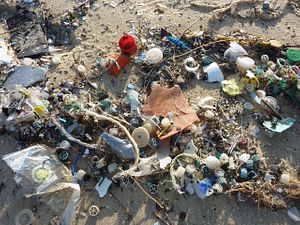Ministers from the Group of 20 (G-20) have taken a tentative step toward curbing plastic waste entering the oceans amid growing global concerns about the problem.
Every year, between 1.15 million tonnes and 2.41 million tonnes of plastic waste enters the ocean from rivers, with the majority of that amounts coming from rivers in Asia, according to estimates published by the journal Nature Communications in 2017. A separate study in PLoS ONE in 2014 indicated that at least 5.25 trillion plastic particles weighing 268,940 tons were floating in the world’s oceans. This vast plastic pollution poses a range of problems, including dangers for wildlife.
G-20 energy and environment ministers discussed the “increasingly urgent” issue when they met in the central Japanese town of Karuizawa on June 15 and 16. It was one of numerous ministerial-level meetings held across Japan in the lead-up to the G-20 leaders’ summit in Osaka on June 28 and 29.
“Marine litter, especially marine plastic litter and microplastics, is a matter requiring urgent action given its adverse impacts on marine ecosystems, livelihoods, and industries including fisheries, tourism, and shipping, and potentially on human health,” G-20 environment ministers said in the part of the communique dealing with green issues.
Because of the global nature of the problem, they stressed the importance of coordinated action in partnership with stakeholders. The G-20 ministers said they were “determined to drive measures to resolve this issue and swiftly take appropriate national actions, including through collaborating with the international community, for the prevention and significant reduction of discharges of plastic litter and microplastics to the oceans through a life-cycle approach.”
Accordingly, the ministers drew up an implementation framework – a document that will guide actions to be taken by G-20 members to reduce marine plastic litter. The plan calls for the development of accurate global-scale monitoring of marine litter, greater information-sharing between governments about what policies have proven effective, and prodding the private sector to embrace environmentally sound product design. The plan also encourages cooperation among G-20 members and with other partners to empower governments, communities, and the private sector to take action, including through technical assistance for those needing capacity building.
Still, the plan has a heavy emphasis on voluntary national actions, so follow-up checks will be crucial to ensure it leads to action. The G-20 plan builds on action taken in other international contexts, including the United Nations Environment Program (UNEP). Further, in Geneva in May, a meeting of the Conference of the Parties to the Basel Convention decided to include plastic waste under the convention. The G-20 ministers pledged to coordinate with relevant organizations to avoid duplication of efforts.
Environmental campaigners were disappointed with the lack of concrete action. Greenpeace Japan campaigner Hiroaki Odachi described the framework as a first step, but said the plastic problem would not be solved if the world relied on individual countries’ voluntary actions. Odachi called for “legally binding international rules with clear timelines and goals” akin to the Paris climate agreement, the AFP news agency reported.
Plastic waste wasn’t the only issue on the agenda at the two-day event, which was called the G-20 Ministerial Meeting on Energy Transitions and Global Environment for Sustainable Growth. The G-20 energy and environment ministers again struggled to reach consensus on climate change in light of U.S. President Donald Trump’s decision to withdraw from the Paris Agreement. In the communique, referring to last year’s G-20 meetings in Argentina, ministers simply noted “the reaffirmation of commitments made in Buenos Aires to the full implementation of the Paris Agreement by those countries that chose in Buenos Aires to implement it.” Despite disagreement on the Paris Agreement, ministers adopted an action plan to drive international cooperation on innovation to tackle climate change and other environmental challenges.
The communique also touched on energy security following attacks on oil tankers in the Strait of Hormuz. In the section agreed by energy ministers, the statement said: “In light of recent developments highlighting concern about energy security, the G-20 Energy Ministers acknowledge energy security as one of the guiding principles for the transformation of energy systems.” Ministers emphasized “the importance of resilience, protection, and development of reliable energy infrastructure to prevent energy supply disruptions; and stress the importance of diversification of energy sources, suppliers, and routes, facilitation of open, flexible, transparent, competitive, stable, and reliable markets, increasing energy efficiency.”
Japanese Prime Minister Shinzo Abe has previously signaled his interest in prioritizing the plastic waste issue as “one of the major themes” of the forthcoming G-20 summit in Osaka. Addressing a meeting of the Ministerial Council on Marine Plastic Litter at the Prime Minister’s Office in Tokyo on May 31, Abe said a worldwide effort was necessary to solve the issue. “As the President of the G-20 Osaka Summit, I intend that Japan exercise its leadership towards the resolution of global issues,” he said.
Japan – where shops routinely place items in plastic bags and other single-use packaging – has conceded that it will have to improve its domestic performance on the issue. It has been widely reported that Japan is the second-largest per-capita consumer of single-use plastic products after the United States. In the lead-up to the G-20 ministerial meeting, Tokyo announced that it was planning to require businesses to charge shoppers for single-use shopping bags from next year in a bid to drive behavioral change.
































